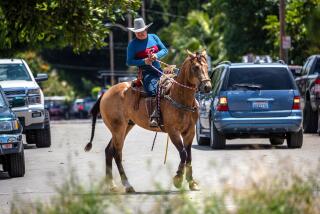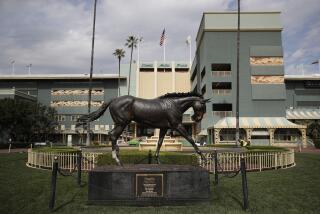Lipizzaners on Shaky Turf in Postwar Bosnia
- Share via
LUZANI, Bosnia-Herzegovina — A Lipizzaner horse is born to be proud, to step smartly and hold its head high, which isn’t easy in this isolated bastion of hard-line Serbian nationalism.
A healthy Lipizzaner is such a mighty charger that when the breed faced extinction in World War II, Gen. George S. Patton ordered the rescue of mares and foals that German troops had stolen.
Nearly five years after Bosnia’s war ended in 1995, 50 Lipizzaners from bloodlines dating back 400 years are languishing on a stud farm with leaky roofs, water shortages, broken fences and a bleak future.
The state-owned Vucijak company, which manages the 1,000-acre farm from nearby Prnjavor, says it can barely afford to feed the horses, let alone give them the veterinary care and training they need to thrive.
The Lipizzaners have the unfortunate fate of being stabled in territory governed by the Serbian Democratic Party, which is closely associated with indicted war crimes suspect Radovan Karadzic.
To punish people for voting in hard-liners, international aid is restricted to humanitarian needs such as medicine, leaving the local government with a lot more to worry about than horses, says Lazar Lazic, Vucijak’s director.
“Because of a very difficult economic and social situation, it’s very hard for the municipality to put aside money for a purpose like this farm,” Lazic said. “They have enough problems with humans.”
Before Bosnia-Herzegovina’s war began in 1992, the stud farm had more than 150 Lipizzaners from five of the breed’s six bloodlines. By the time the war ended, only 64 horses remained, along with a few stable hands who had done all they could to save the animals.
Bosnian Serb soldiers used a beautiful foaling barn on a hill for target practice, says Lucy Wykeham, a spokeswoman for the International League for the Protection of Horses in England. She visited the Bosnian farm twice in 1998.
“Wars are wars, and an army marches on its stomach,” Wykeham said by telephone. “It’s obvious what happened. When we asked them where all these horses had gone, they were a bit shifty.
“It’s not a problem for us if people want to eat horses--fine, then eat horses--as long as they’re humanely destroyed.”
Lazic says the number of horses dropped sharply because many were sold to local farmers to improve the breeding stock.
The farm is in a zone patrolled by British troops in the peacekeeping force led by the North Atlantic Treaty Organization, and British officers stop by from time to time to mount one of the Lipizzaner stallions, Lazic says.
Johnny Irish, a British army veterinarian who provides care for the troops’ dogs, brought the sorry state of the Lipizzaners to the attention of Wykeham’s group two years ago.
The league immediately launched a public appeal for donations to help the Lipizzaners and raised about $105,000, Wykeham says.
All of that has been spent on equipment, staff training and supplies for the farm, except $2,700, which will go toward de-worming foals born in spring. But the organization doesn’t want to hand over that last bit of aid until it is satisfied that the farm’s owners are serious about putting it on a solid footing, Wykeham says.
“The problem that all these studs have is that they just have no reason to be anymore,” she said. “They used to be the showpiece for the government.
“They were used for processions and dignitaries and things like this. The stories we were told of past glory were really quite impressive and very sad.”
Lazic and Wykeham agree that charity isn’t what the Lipizzaners need. The farm has to find a buyer who can make it profitable in a country that has yet to prove that it can survive on its own.
A German horse lover signed a contract to buy the farm for $2.2 million, but Lazic insists that the deal fell through, and the dispute is likely to make it even more difficult to find help for the horses.
The oldest in the stable is also one of the rarest, a retired stud named Sitnica, whose black coat and powerful chest made him the local champion for 20 of his 28 years. Without the ability to sire anymore, he spends his time in a corner stall waiting for the end--and the odd visitor with an apple or some sugar.
No matter what happens to the farm, the stable hands who treat Sitnica like a noble patriarch won’t let anyone take him out back and shoot him, Lazic says.
“He earned his pension,” Lazic added. “He deserves to end his life naturally.”
More to Read
Sign up for Essential California
The most important California stories and recommendations in your inbox every morning.
You may occasionally receive promotional content from the Los Angeles Times.












